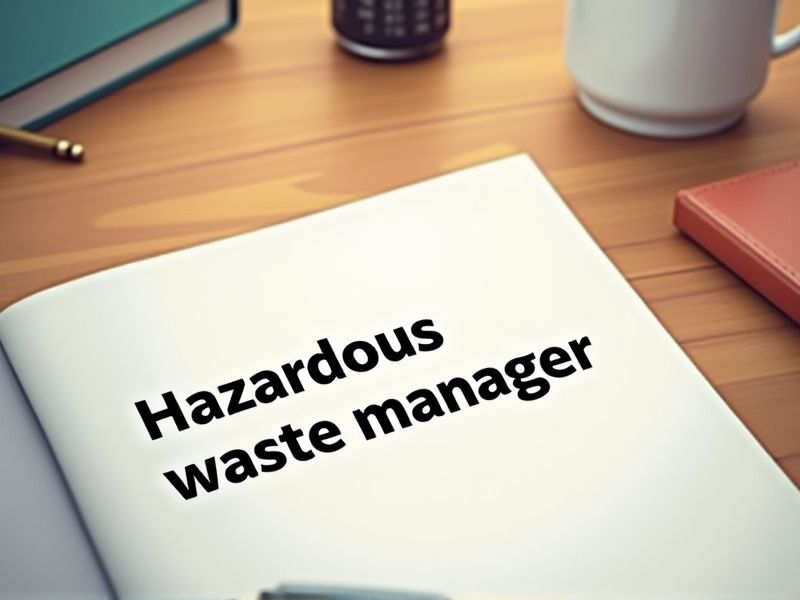
Handling hazardous waste effectively requires an intricate understanding of safety protocols and legal regulations. Certifications equip managers with the knowledge to minimize environmental impact and protect human health. Industry standards mandate specific certifications to ensure compliance and operational efficiency. Some vital certifications you may need as a Hazardous Waste Manager are listed here.
OSHA HAZWOPER 40-Hour Certification
Hazardous waste managers require OSHA HAZWOPER 40-Hour Certification to ensure comprehensive understanding of safety protocols critical in handling hazardous materials. The certification equips managers with the necessary knowledge to assess and mitigate risks associated with hazardous waste operations. Stringent regulatory compliance is vital to prevent workplace accidents and protect the environment, which certification helps achieve. Effective emergency response plans and safety procedures are better implemented with the skills acquired from this certification.
OSHA HAZWOPER 24-Hour Refresher Training
OSHA HAZWOPER 24-Hour Refresher Training is needed to ensure that hazardous waste managers maintain a current understanding of safety protocols, minimizing the risk of exposure to toxic substances. Continuous training helps in adhering to updated regulations, thereby reducing legal liabilities for companies. This refresher course reinforces workers' ability to handle emergency situations effectively, protecting both employees and the environment from potential hazards. Regular training enhances skill proficiency, which directly contributes to a safer workplace and increased productivity.
Certified Hazardous Materials Manager (CHMM)
A Certified Hazardous Materials Manager (CHMM) ensures compliance with regulations, which reduces the risk of penalties for hazardous waste mismanagement. The expertise of a CHMM enhances the safety protocols, effectively minimizing incidents and potential harm to employees and the environment. They are trained to efficiently handle, store, and dispose of hazardous materials, optimizing operational processes and lowering costs. Moreover, having a CHMM contributes to a company's reputation for environmental responsibility, which can positively impact stakeholder trust and business opportunities.
EPA RCRA Training Certification
EPA RCRA Training Certification ensures hazardous waste managers understand regulations, reducing non-compliance risks and potential fines. Completing the certification educates managers on safe handling practices, minimizing environmental and health hazards. They learn proper documentation methods, enhancing operational efficiency and legal accountability. Certification equips managers with emergency response skills, mitigating potential accidents and improving workplace safety.
Hazardous Waste Operations and Emergency Response (HAZWOPER) Certification
HAZWOPER Certification is required for hazardous waste managers to ensure they are adequately trained to handle and manage hazardous materials safely, minimizing risks to health and the environment. The certification provides essential knowledge in emergency response protocols, which is critical in preventing potentially catastrophic incidents during waste handling. Compliance with OSHA standards through this certification helps to avoid legal penalties and ensures that organizations adhere to federal safety regulations. It also enhances the credibility of waste management professionals, as it demonstrates a commitment to maintaining high safety standards and protecting the workforce.
Certified Hazardous Waste Technician (CHWT)
Certified Hazardous Waste Technicians provide the specialized knowledge necessary to safely handle and dispose of hazardous materials, minimizing the risk of accidents. This certification ensures compliance with environmental regulations, which is crucial for avoiding legal penalties and maintaining a clean operational record. CHWTs enable hazardous waste managers to implement efficient waste management processes, which can lead to cost savings and improved resource utilization. A trained technician can quickly adapt to changes in regulations and technology, enhancing the organization's ability to manage waste sustainably.
Certified Environmental Manager (CEM)
Certified Environmental Managers (CEMs) possess specialized knowledge essential for effectively managing hazardous waste, ensuring compliance with environmental regulations. Possessing a CEM credential often correlates with increased safety and efficiency in waste management operations, reducing the risk of environmental contamination. The certification signals a professional commitment to maintaining updated knowledge on the evolving laws and technologies in waste management. Employers and stakeholders frequently favor CEMs for developing sustainable waste management strategies and mitigating potential liabilities.
ISO 14001 Environmental Management Systems Lead Auditor Certification
ISO 14001 certification equips hazardous waste managers with the expertise to implement effective environmental management systems, ensuring compliance with relevant regulations. By understanding these systems, managers can identify and mitigate potential environmental risks associated with hazardous waste handling. This certification also enhances credibility and trust with stakeholders and regulatory bodies, demonstrating a commitment to sustainable practices. Knowledge from the certification aids in optimizing processes, which can lead to cost savings and improved organizational efficiency.
Certified Industrial Hygienist (CIH)
The presence of a Certified Industrial Hygienist (CIH) ensures accurate assessment of potential health risks associated with hazardous waste. This proficiency helps in implementing effective control measures that align with governmental regulations. A CIH's expertise in exposure science contributes to developing comprehensive safety protocols, reducing occupational illness. With their specialized training, CIHs are invaluable in optimizing workplace safety and environmental compliance for hazardous waste management.
Certified Safety Professional (CSP)
Possessing a Certified Safety Professional (CSP) credential enhances a hazardous waste manager's credibility in managing and mitigating potential risks. Regulatory compliance demands comprehensive knowledge of safety standards, which CSP certification ensures. Hazardous waste management involves complex procedures that require the advanced safety expertise that CSP training provides. Employers and stakeholders often view CSP-certified individuals as assets, improving overall trust and operational safety.
Summary
You can significantly enhance your expertise and credibility by obtaining certifications in hazardous waste management. These certifications often lead to improved career prospects and higher salary opportunities. Organizations may also trust your skills more, resulting in increased responsibilities. Compliance with environmental regulations is more efficiently achieved, reducing potential legal risks.
